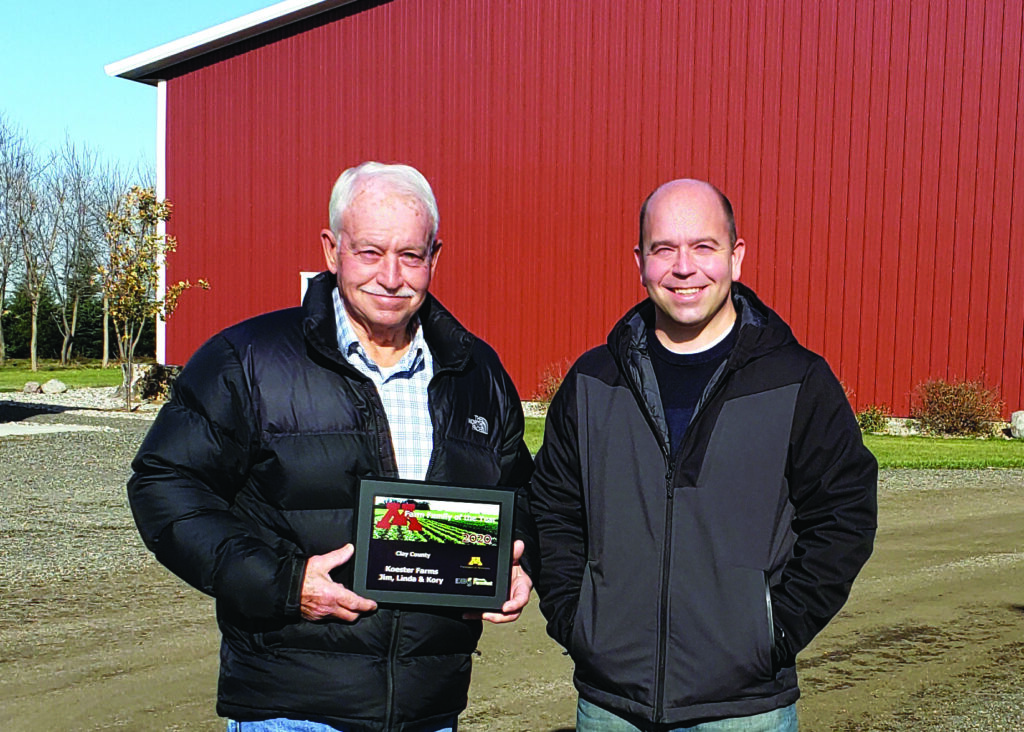
Kory and Jim Koester received their Clay County Farm Family of the Year award from University of Minnesota Extension by mail, after the annual statewide ceremony was cancelled due to Covid. Photo/Nancy Hanson
Nancy Edmonds Hanson
Jim Koester was barely 4 years old when his father, Kenneth John – who had been a tenant farmer – put together the funds to purchase a quarter of Clay County land to establish his own farm. The year was 1947. The location: just west of the Buffalo River, where his wife’s pioneer Thortvedt clan had become one of Clay County’s very first settlers.
Jim, who shares his father’s first name but neighbors know as “Jimmy,” has spent his entire life on that land. It’s where he and his wife Linda raised their two sons. They welcomed the younger, Kory, into the family operation nearly two decades ago. And now, 73 years after those first fields planted the seed of Koester Farms, the three Koesters have been named Clay County’s Farm Family of the Year.
Walking across their neat-as-a-pin farmstead just north of Highway 10 on County 11, Jim and Kory note that the annual honor came as a complete surprise to them. “Linda got a call, and we filled out some paperwork,” Jim recounts. “We were in the middle of spring planting when we got the call.”
In the 30-plus years that the University of Minnesota Extension Service has awarded the title, 2020 stands out as an anomaly. There was no Minnesota Farmfest in August to honor 87 county winners in this pandemic year. Instead, their plaque arrived in the mail one day – prized just the same despite the lack of fanfare.
Though reduced to a virtual event by the pandemic, the award marks a high point in the family’s long Clay County story. Today Jim and Kory farm about 1,400 acres, half owned and half leased from neighboring farmers. The population of multi-generation farming families whom Jim grew up with is being thinned by retirements and a younger generation that’s moved on to other pursuits. Yet the Koesters are looking forward to many more years ahead.
“Do I miss the old days? No,” Jim says firmly. “The only good thing was that everybody had their gardens and their cows, pigs and chickens. You didn’t need to go to town to shop. It was hard work, but we were all self-sufficient. Now, without a bumper crop, it seems like you can’t survive.”
The Koester operation has evolved dramatically over the years. “My father used to have potatoes, along with soybeans and wheat,” Jim reports. “A few years after he died in 1976, I got out of potatoes and into sugar beets.” That era ended 20 years ago – “it was just getting too hard to find help” He notes that he moved out of beets only a year or two before Roundup-ready varieties were introduced, reducing the necessary labor considerably.
He moved on to dry edible beans. But making the three-hour round trip to Casselton to sell his pintos and navies proved to be a problem, along with the issues surrounding grading the beans.
He and Kory, who joined him after graduating from college, decided to raise corn in 2012. “We always had some, but the prices were going up with the ethanol markets,” Kory points out. “There were better varieties available with more yield potential.” Rising soybean prices, too, have drawn them into raising food-grade beans. Then prices tanked. “You can never tell what’s going to happen next,” he observes wryly.
And that’s just as true about the weather. In 2019, heavy precipitation dogged them. “We finished our food beans Nov. 8 and the corn Nov. 23. We couldn’t get the fields worked like we should,” he points out. While that doubled the work for farmers this spring, the year has brought a “decent harvest.” “We had to fields that averaged more than 200 bushels.”
Jim says he never wanted to be anything but a farmer. “I hated school,” he says with a laugh. “I always knew I’d be a farmer, and I couldn’t see how farmers needed to know any of that.”
Kory, on the other hand, had different thoughts. “It was the last thing I wanted to do. I wanted to play baseball or do something else that was sports-related.” After graduating from Dilworth-Glyndon-Felton High School in 1999, he attended Concordia for a year. He planned to move to Florida, where sports-related opportunities flourished.
“Then Dad got prostate cancer,” he recounts. “I helped out more and more, and ended up going to Aker’s Business College in Fargo for business management with an emphasis on sales and marketing.” Living at home, he also raised 80 acres of edible beans.
“Dad was getting up in age,” he reminisces. “He and Mom built a new house here, and he was thinking of retiring. I figured that I’d have one chance to carry it on. If I didn’t give it a shot, I might regret it later.” So he did. Today he lives in his parents’ original house with his dog Satchel and shares the work with his dad.
Jim is still deeply involved in their rural community. He has served more than 50 years as the treasurer of the Moland Township board as well as Concordia Lutheran Church four miles to the north of their farm. “I was baptized in the church. I’ve been there since Day One,” he points out.
As for retirement, that thought seems to have fled from Jim’s mind. “It’s gotten so easy with the new equipment and all,” he says. “What’s not to like? If I weren’t farming, I’d go nuts.”


